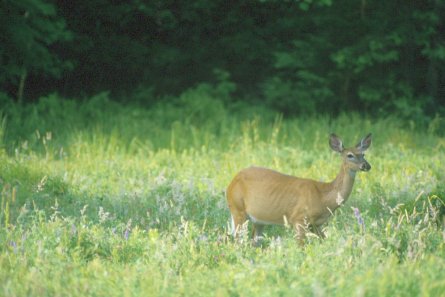
by: Tom Mason
JULY 2001
Date of Post: July 2003

The habitat of the white-tailed deer covers much of Nova Scotia.
Anyone familiar with organizations like Ducks Unlimited knows that hunters have been a key part of the conservation sector a long time. Now a new fund gives every hunter in Nova Scotia the opportunity to support conservation projects and give something back to the government.
The Wildlife Habitat Conservation Fund is a new initiative that will take two dollars from every hunting licence purchased in the province in the form of a stamp surcharge. Maintained under the Nova Scotia Wildlife Act, the fund is expected to generate $125,000 in annual revenues, according to Barry Sabean, director of wildlife for the Nova Scotia Department of Lands and Forestry - revenues that will be used to fund a variety of worthwhile projects.
"Anyone with a habitat conservation project can make an application to the fund," says Sabean. Projects could include anything from developing an urban or agricultural area into a wildlife habitat to programs to educate the public about habitat conservation. If recommended by the fund board, as much as 75 per cent of overall funding could potentially be provided to a project.
The board expects to receive applications from many groups and individuals including universities, grassroots fish and game societies, clubs, and conservation groups. Each application will be reviewed by DNR program managers and regional biologists, who will then provide an appraisal of the project to the fund's board of directors.
Sabean says the key to making the Wildlife Habitat Conservation Fund work is the active participation of hunters in the program, particularly the Federation of Anglers and Hunters. The Habitat Fund board is set up so that hunters have a majority vote; three members of the five-person board represent the Nova Scotia Federation of Anglers and Hunters. The other two board members are appointed by the Federation of Nova Scotia Naturalists and the Atlantic Canada Wildlife Ecology Research Network.
"So far, we're getting a positive reaction from the hunting community," says Sabean. "But most hunters are waiting to see how the money is used before they pass final judgment. We will be providing regular board updates to keep everyone aware of exactly how the fund is being used."
One of the advantages of the fund is that not all money must be used in a particular fiscal year. Any money not spent this year can be used to fund projects in subsequent years.
Anyone interested in applying to the Wildlife Habitat Conservation Fund can find more information at www.novascotia.ca/natr/wildlife/habfund or by contacting any office of the Department of Lands and Forestry.

Moose prefer barrens, bogs and evergreen forests deep within Nova Scotia's hinterlands.